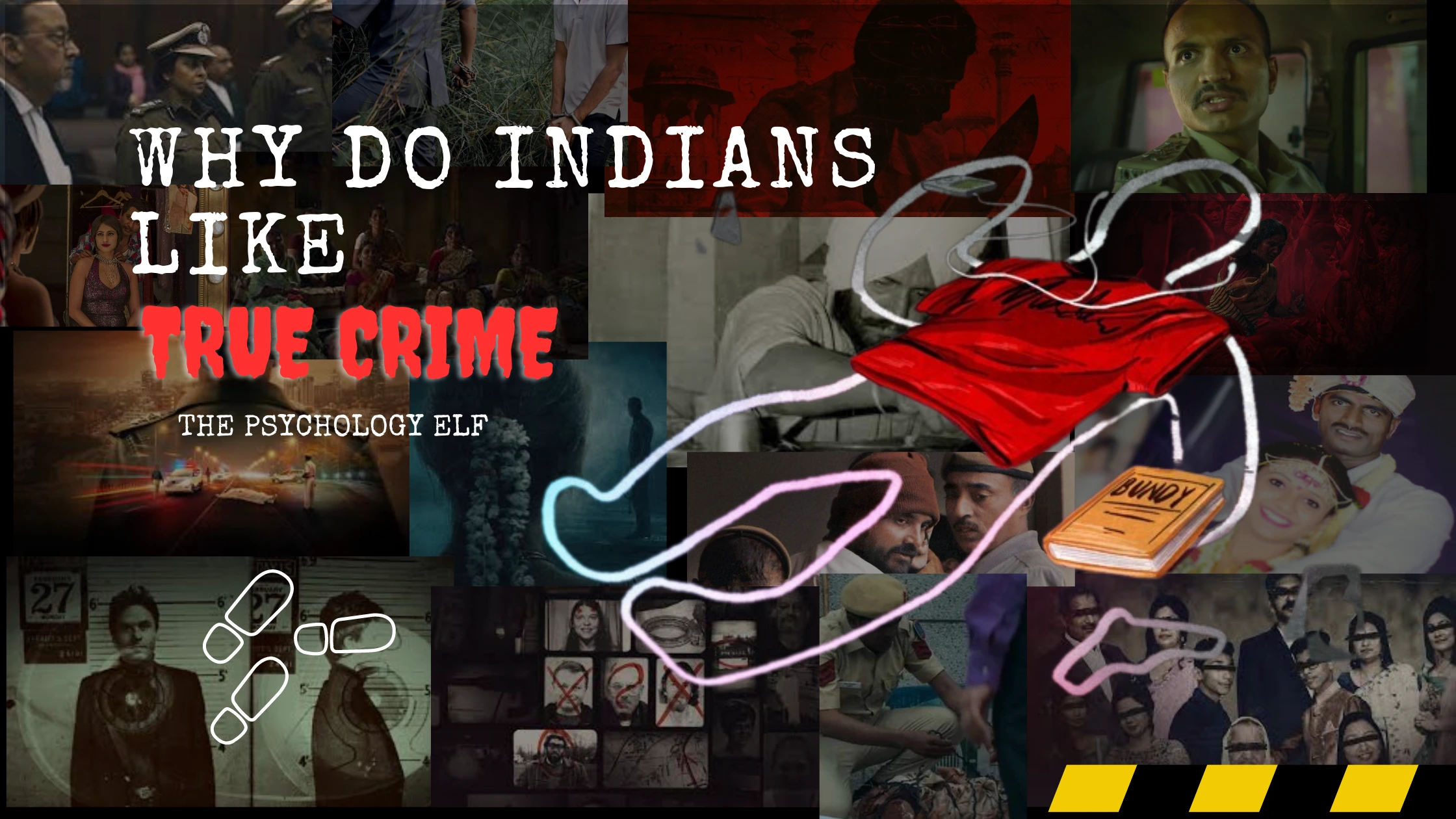If you’re from an Indian household, then I’m sure you’ve at least some memory of shows like Crime Patrol, Savdhan India, or CID playing on the TV. But, who watches these shows anymore (maybe boomers)? We Indians now have a newfound obsession with true crime, right? We no longer talk about those ‘sansani’ Crime Patrol episodes. Our talks now revolve around Charles Sobhraj, Chandrakant Jha, the Burari deaths, etc. It doesn’t take long for a true crime show to release on Indian Netflix and take place in the top 10. But, have you ever wondered, why do Indians like true crime after all?
And well, there are some pretty valid reasons to explain why we’re fascinated by the unapologetic gory, gruesome descriptions of heinous crimes. There’s a reason why someone’s lived tragedy, the worst day of their lives, makes for a good podcast, show, or movie and ends up topping all charts and winning awards. It’s understandable why people like to listen to/ watch macabre true crime podcasts and shows when they run errands, do their assignments, or are just seeking a bit of comfort after a murderous day at work.
The reasons why Indians like true crime may surprise you. But, before we get into that, let’s see what people have got to say about like true crime.

Swayam Agarwal, an avid listener of the Desi Crime podcast says “It (true crime) gives me a thrill, something interesting to listen to. I have a long travel time to my work, so this true crime thing helps me by keeping my mind occupied. And secondly, these stories bring an interesting change in my viewpoint towards a particular city or area and its history”.
Similarly, you’re going to find plenty of users giving various different reasons for being into true crime shows. Some reasons for the fascination are common– comfort, thrill, etc. And even though their reasons are pretty interesting, let’s understand why Indians like true crime from the perspective of Ms. Apabrita, a Forensic Psychologist.
To Satiate Curiosity
According to Apabrita, there are various factors that contribute to a person’s obsession with true crime. For starters, humans are naturally curious beings and true crime shows satiate this curiosity by providing an in-depth look at criminal behavior, psychology, and law enforcement techniques.
To Have A Sense Of Control
It’s a bad bad world out there, we all can agree to that. Apabrita says, watching true crime shows can provide a sense of control over dangerous or unpredictable situations. By learning about the methods and motives of criminals, viewers may feel more equipped to protect themselves and their loved ones from harm.
Escapism
You think your life is problematic? Oh well, what about the victim in xyz true crime show/ movie/ podcast? You see, this is where escapism comes into the picture and makes it hard to say no to true crime. “For some people, true crime shows can provide an escape from their own lives and problems. By immersing themselves in the stories of others, they can temporarily forget about their own worries and concerns,” says Apabrita.
Social Connections
Do you have like-minded friends or family members that you discuss these true crime shows with? Because you know, according to Apabrita, this shared interest can help foster social connections and instill a sense of belonging.
You might be thinking, CID, Savdhaan India, Crime Patrol, etc. can provide these things as well. Then, why is true crime more popular than them? Well, this is because, although the stories that you see on these shows claim to be based on “real life incidents”, still lack the human elements. And as stated by Apabrita, “True crime shows often focus on the stories of real people who have been impacted by crime, including victims, investigators, and family members. This human element can be emotionally resonant and make the stories more relatable and compelling for viewers.”
I personally find true crime content relaxing. Don’t judge me for this, hey. Because there are some pretty solid reasons for this too! And, you know what? I’m not alone. This feeling is shared by many.
But why? How can a macabre tale of brutal murders make for a stress-busting true crime documentary or podcast? When asked the reason behind the same, Apabrita said that even though this seems counter-intuitive, people find true crime content to be stress-busting because of several possible reasons. For example, catharsis (emotional release), a distraction from one’s own problems, or getting to live through dangerous situations right from the comfort and safety of one’s own couch.
Pop Culture
And hey, wait. How can we forget the role of pop culture in making Indian true crime even more famous? These days, being a true crime fan/ fanatic/ aficionado is the trend. Have a look at the reels, the memes, and the tweets, and you’ll know exactly what I’m talking about.
Safety Reasons
But you know, there are several people who outrightly deny that social media or any of the above-mentioned reasons have got anything to do with them liking true crime. In fact, they don’t like true crime at all! They have to watch it to learn how to keep themselves safe. They say these shows show them what goes on inside the mind of a criminal and answer the nagging question: why they do what they do.
For example, Saloni, a 22-year-old Psychology student watches true crime shows to understand what influences a person to deviate that much from societal norms and standards. This, according to her, can help in saving people from becoming victims of heinous crimes and abuse. Plus, by understanding the MO of criminals, catching them can become easier too.
And this does make sense. Indian Predator: The Butcher of Delhi, did discuss Jha’s personality traits, psychosocial issues, and past experiences that led him to kill over 44 people. However, please note that a justification for his crimes is not condonement.
And well, once people understand how the mind of a criminal works, they can take all the precautions that the victim didn’t take. But, it has been proven that the true crime genre makes us believe that the chances of being the victim are way higher than reality. So, is watching truly a matter of keeping oneself safe?
To this, Apabrita says, some people DO watch true crime to learn about criminal behavior and take necessary precautions to keep themselves safe. The annual NCRB report showed that 60.96 lakh cognizable crimes were registered in 2021. Out of this, 4.28 lakh cases were about crimes against women. And this is a 15.3% increase as compared to 2020.
And maybe, this is why some studies claim that women take the better part of true crime content viewership.
Now, you might think that the reason behind this is obvious – women are more likely to be the victims of violent crime, and that’s why, they have a greater need and/or interest in learning about criminal behavior. This will in turn teach them how they can better protect themselves, how they can do things that the poor victim didn’t, and so on. And yes, this is true to a huge extent as well.
Plus, Apabrita says that the complex psychological and social dynamics shown in these true crime shows and podcasts may be of particular interest to women.
But, it’s important to recognize that these stories vastly exaggerate the likelihood of a person being a victim of a horrific crime than statistically possible. And even though it’s recommended to be aware of all the dangers out there and prepare accordingly, consuming too much true crime content can make one hypervigilant and have adverse effects on mental health and behavior.
And so, Apabrita says that “It’s important to approach the true crime genre with a critical eye and understand that these stories are often presented for entertainment purposes rather than as a practical guide to personal safety. While learning about criminal behavior and law enforcement may be helpful in some situations, it’s also important to take a balanced approach to personal safety by focusing on practical measures such as home security, self-defense training, and awareness of one’s surroundings.”
She further adds, “Ultimately, the decision to watch true crime shows is a personal one, and different people may have different reasons for doing so. ”

